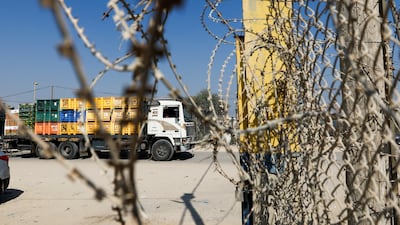Gazans are sounding the alarm on the fate of their livelihoods after Israel banned all exports from the Palestinian enclave over the alleged smuggling of explosives in shipments sent through the Karm Abu Salem crossing.
The crossing, called Kerem Shalom by Israel, is the only conduit for commercial goods, fuel and aid between Israel and Gaza, which has been under an Israeli blockade since 2007.
The Israeli military said it “detected several kilograms of high-quality explosives, hidden within a clothing delivery" in three lorries at the crossing.
Exports will be halted "allowing security adjustments to be made at the crossing", Israel's army said.
“Deliveries will resume in accordance with subsequent situation assessments,” it added.
The General Federation of Palestinian Industries said the suspension hit a "main pillar" of Gaza's economy, which has struggled under the Israeli blockade.
"The Israeli decision will also be detrimental to all aspects of the economy, hindering hundreds of institutions and affecting the lives of thousands of workers," spokesman Waddah Bseiso said at an emergency press conference held on Tuesday morning, hours after the export ban was announced.
Mr Bseiso accused Israel of imposing "collective punishment" against Gazans, and said the territory's Chamber of Commerce adhered to export laws.
Ahmad Hassan Shehade, owner of textile factory, told The National that the ban would severely affect his business, especially because of its timing.
Mr Shehade said he was under great pressure to deliver his orders in time for Rosh Hashanah – the beginning of the Jewish new year on September 16.
"I have 4,000 units of garments to hand over and the ban, if it lasts for more than a week, will mean that I will default on several contracts, deadlines and agreements with stores and companies in Israel," he said.
Mr Shehade said he sold each unit for about 200 shekels ($52).
He said the impact of the export ban would be felt far beyond his factory.
"I have 70 to 80 people working in the factory — that's 70 to 80 families inside. Outside, I have around 200 or so families who depend on the work that we do for their daily income."
Mr Shehade said his business would not survive if the crossing remained closed for longer than a week.
"For now, I have had to stop all work outside the factory. If the situation stays the same, and does not go back to the way it was, I will have to close down in a week."

Almost 2,500 lorry-loads of goods were exported from Gaza to Israel last year, according to Gisha, an Israeli non-profit organisation for the protection of "freedom of movement of Palestinians".
The items exported include textiles, furniture and agricultural goods, all of which are shipped through the Karm Abu Salem commercial crossing.
The flow of goods was already much lower than before the blockade was imposed. In 2005, almost 10,000 lorries left Gaza, mostly headed for Israel, Gisha said.
Separately, the Israel military said on Tuesday that troops confiscated weapons and explosives during a raid in the Noor Al Shams refugee camp east of the West Bank city of Tulkarm.
A Palestinian man, identified as Ayed Abu Harb, was killed the operation. The militant group Al Quds Brigades claimed him as one of its fighters.

